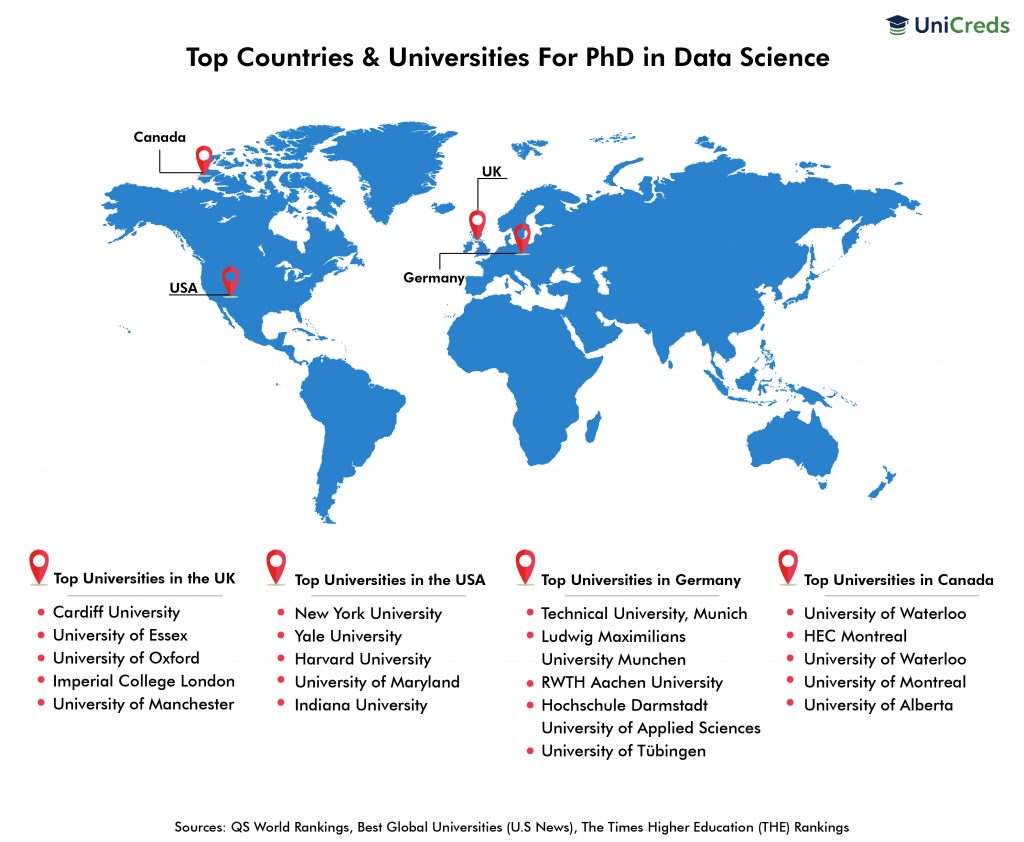Table of Contents
Data science is still evolving as one of the most promising and demanding job options for experts. Successful data professionals now realise that they need to develop the conventional abilities to analyse huge quantities of data, data extraction and programming.
Data scientists have to grasp the whole spectrum of the data science life process and be flexible and intelligent to optimise returns at each stage of the process in order to detect relevant intelligence for their company.
What Is Data Science?
In 2008, corporations noticed the need for individuals who are qualified to organise and analyze enormous volumes of data and the term “data scientist” was only coined by D.J. Patil, and Jeff Hammerbacher. Data Science is an interdisciplinary field that extracts and organises unstructured data using methods, processes, algorithms and dedicated systems.
Efficient data researchers develop relevant questions, acquire data from a variety of data sources, organise the information, convert the findings into solutions, and present their findings in a manner that has a beneficial impact on business choices. In virtually all industries these abilities are necessary, which means that qualified data scientists are more important for enterprises.
Do You Need A Degree To Become A Data Scientist?
Data Science is one of the fastest-growing careers in the 21st century and this industry has provided a solution to a number of challenges right from collecting big data, analysing this data and data representation. Data scientists are educated in a variety of fields and most will have some sort of technical training. A wide variety of majors in Computer Sciences, plus mathematical fields and statistics is included for data science graduates. Business or human behaviour, which provides more accurate findings in the data science activity, is also prevalent.
Most individuals who are interested in becoming data scientists start preparing for this subject straight after school. This subject has permeated into all levels of education, starting from a Bachelor’s degree to a PhD in Data Science. Since the demand for this subject has increased in recent years, many universities and colleges around the world have started offering blended learning courses to help students join this industry even if they have not been preparing for it since the beginning.
There Is A Difference Between Data Science and Statistics
Even though the field of Data Science and Statistics work on similar principles of data, these two are not the same. While statistics focuses on creating and representing logical data using quantitative means such as syntax and semantics, Data Science relies heavily on computers and technology. It accesses information from large databases, uses code to manipulate data, and visualizes numbers in a digital format.
By now, you must have understood the meaning and use of Data Science. So let us now take a look at some of the most relevant questions asked related to this subject. This guide on PhD in Data Science will cover the following topics:
- What can students do after getting a PhD in Data Science?
- Which are the top universities offering PhDs in Data Science?
- What are the sources of paying for tuition fees for a PhD in Data Science?
Let us answer these questions one by one.
What Can Students Do After Getting A PhD in Data Science?

Data Analyst
Data analysts bridge the gap between data and corporate analysts. They receive the questions that an organisation needs to answer and then arrange and analyse information to identify results in line with high-level business strategies. It is the responsibility of data analysts to translate technical analysis into qualitative measures and communicate its findings effectively to different audiences.
Average Salary: $65,000
Skills Required: Programming skills (SAS, R, Python), statistical and mathematical skills, data wrangling, data visualization.
Data Engineer
An IT worker is a data engineer whose main task is to generate data for analysis or operation.
The generic responsibility of these software engineers is to design data pipelines to gather information from diverse sources. Data engineers manage quickly changing data in exponential quantities. They concentrate on developing, deploying, managing and optimising data pipelines and infrastructure to transform and transfer data for querying to data scientists.
Average Salary: $120,900
Skills Required: Programming languages (Java, Scala), NoSQL databases (MongoDB, Cassandra DB), frameworks (Apache Hadoop).
Data Scientist
As mentioned above, Data scientists look at the queries and where the associated data should be found. They are capable of understanding the business, analytical abilities, and mining, cleaning and presenting data. Data scientist companies are using vast numbers of unstructured data to source, manage and analyse it. Results will then be aggregated and discussed with key players to help the company make strategic decisions.
Average Salary: $100,500
Skills Required: Data visualisation, Statistics and Maths, Analytics and Modeling, Programming knowledge.
Data Architect
A data architect is an expert in data architecture, a discipline in data management that designs, creates, deploys and manages the data architecture of an organisation. Data architects develop ways in which distinct data entities and IT systems store, consume, integrate, and manage the data, and any applications that use or manage this data in some way. It is strongly linked to corporate architecture and is one of the four areas of corporate architecture.
Average Salary: $60,000 to $109,000
Skills Required: Java, Python, ETL, Hadoop, Spark, Yarn and Kafka, RDBMS and SQL systems and analytics platforms.
Which Are The Top Universities That Offer a PhD In Data Science?

Before we dive into knowing about the list of the top universities that offer a PhD in Data Science, let us first take a look at the best countries in the world where you can study data science as a foreign student. The UK, the USA, New Zealand, Australia, France, Germany, Canada, Ireland, Netherlands and Russia are the best countries when it comes to studying Data Science.
Top Universities in the UK that offer PhD in Data Science:
The average cost of pursuing PhD in Data Science ranges between £23,500 to £26,240 per semester for international students. The tuition fees also depend on the university one is planning to study in. Here is a list of the top universities in the UK for PhD in Data Science according to the QS World Rankings:
- Cardiff University
- University of Essex
- University of Oxford
- Imperial College London
- University of Manchester
- University of Cambridge
- University College London
- University of Edinburgh
- University of Bristol
- University of Exeter
Top Universities in the USA that offer PhD in Data Science:
The cost of doing Phd in Data Science from the USA is slightly on the higher extreme of the cost spectrum. Depending on whether you are an international student and the choice of your university, the cost of a full-time Phd from a university from the USA ranges between $30,000 to $45,000 per year.
Here is a list of the top universities in the USA that offer PhD programmes in Data Science according to the U.S. News & World Report rankings:
- New York University
- Yale University
- Harvard University
- University of Maryland
- Indiana University
- University of Massachusetts Boston
- California Institute of Technology
- Kennesaw State University
- University of Wisconsin
- University of South Florida
Top Universities in Germany that offer PhD in Data Science:
Most German universities that are public do not expect students to pay tuition fees. In other words, a 2 to 6 year PhD programme is free for international students who are studying any subject at a public university in Germany. The average cost of pursuing Phd in Data Science in a private university in Germany will range between Є15,000 to Є30,000 per year. According to The Times Higher Education (THE) Rankings, here are the universities in Germany that offer high-quality doctoral programmes in Data Science:
- Technical University, Munich
- Ludwig Maximilians University Munchen
- RWTH Aachen University
- Hochschule Darmstadt University of Applied Sciences
- University of Tübingen
- University of Mannheim
- Jacobs University
- University of Magdeburg
- Free University Berlin
- Technical University Berlin
Top Universities in Canada that offer PhD in Data Science:
The tuition fees for doctoral students ranges between CAD 17,000 to CAD 35,000 per year. The cost of pursuing a PhD in Data Science from Canada will also depend on the university you choose, so here is a list of the top universities in Canada that offer PhD in Data Science according to U.S. News & Best Global Universities Rankings are:
- University of Waterloo
- HEC Montreal
- University of Waterloo
- University of Montreal
- University of Alberta
- Ryerson University
- University of New Brunswick
- Dalhousie University
- McGill University
- University of Ottawa
Australia is also a popular destination for students who wish to pursue a doctoral degree in Computer and Data Science. According to Indeed, the top American website for job listing and employment
Top Universities in Australia that offer PhD in Data and Computer Science are:
Depending on whether you are an international student or a domestic student, the tuition fees for PhD programs in Computer and Data Science vary. The average cost of a PhD in this field ranges between AUD 35,000 to AUD 85,000. The fees also depend on the university you choose. Here are some of the top universities that offer a PhD in Data Science in Australia according to QS World Rankings.
- Deakin University
- University of New South Wales
- University of Sydney
- Monash University
- RMIT University
- University of Melbourne
- Macquarie University
- Victoria University
- University of Queensland
- Edith Cowan University
Ways To Fund Your PhD Education In Data Science Abroad
Depending on your financial status and academic records, you can accumulate and fund your education in two broad ways: Scholarships and Education loans.
Scholarships
The first way is by applying for study abroad scholarships. Study abroad scholarships are made available by destination and will host countries to students who either have an excellent academic record or need financial assistance to pursue their higher education in a foreign country. All in all, there are five types of scholarships and these are:
- Merit-based scholarships:
These scholarships uplift students and help them reach greater heights. Any student can be a promising candidate on the basis of his/her academic excellence or any other merit like sports or extracurricular activities.
- Need-based scholarships:
These scholarships aim to become the backbone of students who are unable to fulfill their dreams because of a lack of funds or low-income backgrounds.
- Country-specific scholarships:
Every year, numerous students move to different countries from around the world for higher studies. Keeping this in mind, the country-specific scholarships focus on bringing a more diverse and inclusive student demographic to universities across the globe.
- College-specific scholarships:
These scholarships are for students who have their hearts set on a particular university. Usually, your target university will make arrangements to support you financially based on certain criteria such as average performance, annual family income, future plans, etc.
- Student specific scholarships:
These scholarships are for students from low-income families or those who have survived chronic diseases. These scholarships are also for under-represented populations, particularly women and minorities.
Education Loans
In cases where students are unable to meet their tuition fees and living expenses to study abroad using their personal finances or have failed to apply for a scholarship, they may go for an education loan. Education loans are highly country-specific and depend on the financial policies of the country you belong to. Every country has its own arrangements of financial institutions such as banks or non-financial institutions (NBFCs) that facilitate the operation of providing education loans to students.
NBFCs such as UniCreds offer the best solutions to students for education loans such as loans with low-interest rates, a choice of 10+ financial institution partners to opt from, loans without collateral, and highly personalised loans. You may choose to study in countries like the USA, the UK, Australia, New Zealand, Canada, France, Germany and Ireland with the help of financial assistance from such NBFCs that offer a seamless experience to students while delivering education loans.





![60+ Extempore Topics for Students in 2025 [Speak Confidently]](https://cdn.unicreds.com/blog/wp-content/uploads/2025/06/22121909/extempore-topics-for-students-1080x675.webp)




0 Comments